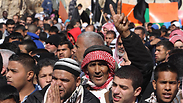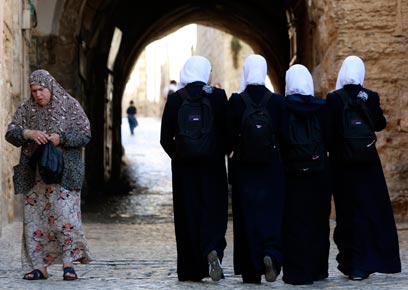
Israeli Arabs. The double identity is seven times harder these days
צילום: גיל יוחנן
Israeli Arabs are choosing integration over seclusion
Op-ed: Studies clearly show that Israel's Arab citizens play a minimal part in terror, despite collective feelings that have a potential for radicalization and revolt; the government must encourage their adaptation processes.
It’s hard to be both an Arab and a Muslim, as well as an Israeli citizen. It's hard to be a citizen in a state which is your people's enemy of your people, in which institutions discriminate against you, many groups among its majority see you as a danger, and the government places you at the bottom of its list of priorities. It's hard to live with complex identities and a dilemma of loyalties.

Make no mistake: In their ethnic national identity, Israel's Arabs are Palestinians just like their brethren in Nablus, Hebron and Gaza, or those living in Jordan and Lebanon. The reality of their lives as Israeli citizens was forced on them in 1948 as a result of the State's establishment, and the Oslo Agreements imposed their future within the State of Israel, as the PLO's recognition of Israel set the borders of the Palestinian political battle to the 1967 lines and excluded them from the diplomatic-political solution of their national movement. They remain part of the conflict problem but not part of its solution.
In the past two decades, despite traumatic crises like the October 2000 events, there appears to be a consistent trend among Israel's Arabs of adjusting and integrating into the State's life. The reality of life and the desire to remain on their land dragged them into Israelization processes, and today it is impossible to disconnect them from the Israeli society.
They have a prominent presence in the field of medicine ("if there are no Arabs, there are no pharmacists") and in the food industry, representation in sports (not just Bnei Sakhnin), in theater, in cinema and television ("Big Brother," "Survivor"). Many study in Israeli universities and colleges. Most of them are fluent in Hebrew - and in general, they have created a new language, "Arabrew," which combines elements and grammar from the Hebrew language. They adapt to the standards of living and style of the Jewish society.

Despite the identity complex, Israel's Arab citizens have succeeded in developing psychological mechanisms which allow them to maintain their initial Palestinian identity while sticking to their civil Israeli identity (Photo: Reuters) (צילום: רויטרס)
The adaptation trend is also reflected in politics, particularly under Ayman Odeh's leadership as head of the Joint Arab List. Odeh is redirecting the Arab citizens' battle for equal rights. Their political demands for ending the conflict, according to the two-state vision, are not much different from the Israeli Left's demands.
The Palestinian citizens of Israel have succeeded, despite the identity complexity, in developing psychological mechanisms which allow them to maintain their initial Palestinian identity while sticking to their civil Israeli identity at the same time. A survey conducted by Prof. Sammy Smooha of Haifa University in November 2015 reveals that 73.2 percent of the Arabs have an Israeli component in their identity. That's a lot. These trends have increased in the past year.
This double identity is seven times harder these days. The overwhelming majority of Arabs in Israel condemned and denounced the murder in Tel Aviv, after distinguishing themselves from the Palestinians knifing terror in the territories and responding with restraint to the decision to outlaw the Islamic Movement. Studies on their involvement in harming the State's security clearly show that they play a minimal part in terror, despite being filled with collective feelings that have a potential for radicalization, revolt and seclusion.
The government and its different wings must encourage the adaptation processes, work to integrate the Arabs into the State's life and adopt a practical policy for equal rights, generously allot budgets for infrastructures, solve the illegal construction problem, develop industrial zones, introduce an emphasis on tolerance and respect for the other into the Jewish and Arab schools' curriculum, and work to enforce the law and strengthen the police in the Arab sector - not just for security-related purposes. And as important: To stop the blatant rhetoric which collectively vilifies Arab citizens.
We can start off with a small step of conscious repair: The prime minister should take back the demands he imposed as a condition for transferring the special budget to the Arab population. Such a move could improve the atmosphere, contribute to the Arabs' adaptation and integration into the Israeli society, and to security as well.
Dr. Ronni Shaked, Yedioth Ahronoth's former correspondent and commentator on Palestinian affairs, is a research fellow at the Harry S. Truman Research Institute for the Advancement of Peace at Hebrew University.










